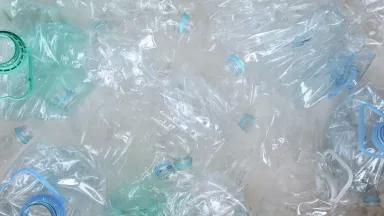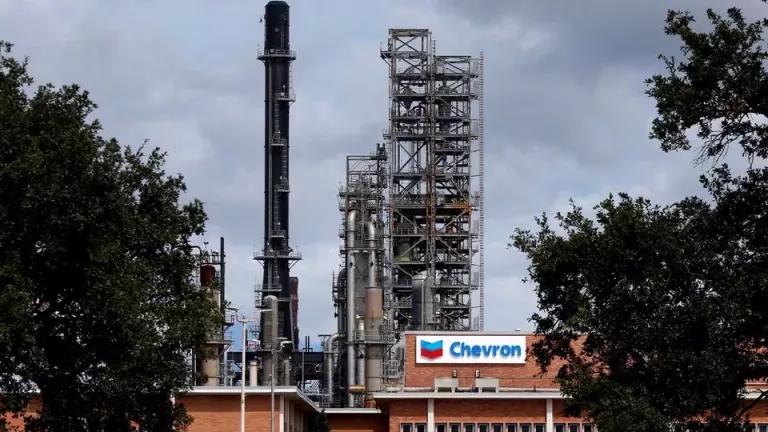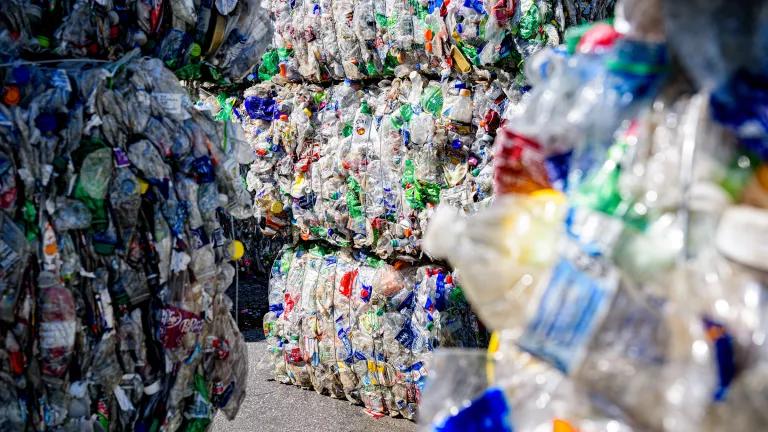Problem Plastics Are Poisoning People and Polluting the Planet
Plastic polymers, chemical additives, and plastic products that pose the greatest hazards and/ or are unnecessary should be phased out.
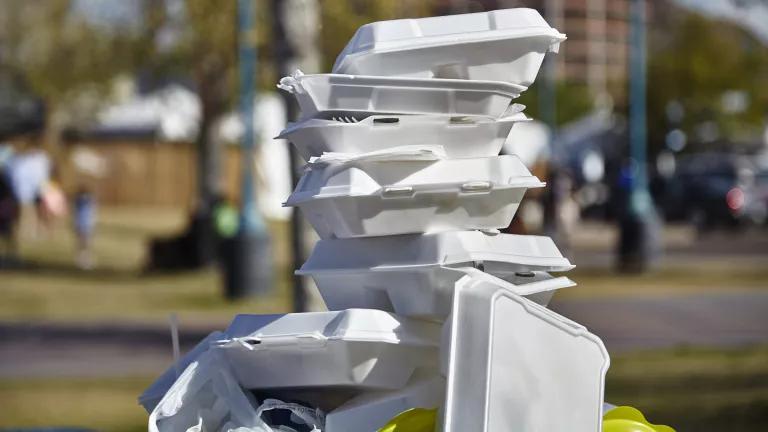
Single use disposable polystyrene food containers being thrown away
iStock
This blog is co-authored with Renée Sharp, strategic advisor to Safer States and partner at Insight Power Partners
Plastics are poisoning our air and water, increasing diseases like cancers, killing wildlife, and driving environmental injustices. We must curb plastic production to prevent these types of harms in the future. This is what leading scientists and physicians concluded after comprehensively reviewing existing data. As the third negotiating session for an international treaty to address plastic pollution gets underway, one question is top of mind for many: Where do we start on cutting plastic production?
As we lay out in our fact sheet on the very worst plastics, there are a host of plastics, chemical additives and products that should be the first targets for phase out. These pose significant hazards to human health and the environment, are difficult to recycle and/or interfere with mechanical recycling systems, and/or are purely unnecessary. Only materials that do not contain hazardous chemicals, are safe and sustainable by design, and that are part of non-toxic materials cycles belong in the circular economy—and these plastics do not meet those criteria.
Most single-use plastics and much plastic packaging is unnecessary and could be phased out in favor of unpackaging solutions, reuse/ refill systems or other, safer materials. For these, one question that we often hear is whether bioplastics may be a safer replacement material. As discussed in our previous fact sheets, the term “bioplastics” is used to refer to a wide range of products created as alternatives to traditional fossil fuel-derived plastics. First, making hazardous chemicals from biological feedstocks does not make them less toxic- the safety and toxicity issues of the chemistries themselves are the same whether they are made from fossil fuels, plants, or other biological materials.
Second, even if a bioplastic uses safer chemicals, it does not necessarily mean that the material is free of fossil fuels, compostable, or otherwise an ecologically preferable alternative. While there may be a limited role for plant-derived plastics, such as for durable products or for some single-use certified compostable plastic food serviceware, plant-based plastics can also pose environmental challenges:
- Even plant-derived plastics that are certified as compostable are typically designed to break down efficiently only in commercial composting systems.
- Plant-based and compostable plastics may have the same toxic additives (dyes, plasticizers, etc.) as fossil fuel-derived plastics, potentially causing toxic release and health harm in production, use, and disposal.
- Even if plastics are plant-based and compostable, if they become litter, they can persist long enough to harm water systems and wildlife.
- Finally, even if single-use plastics are plant-based, compostable, and free of harmful toxic additives, they are still designed to be used once and then discarded, creating unnecessary pollution production and resource use compared with refillable and reusable alternatives.
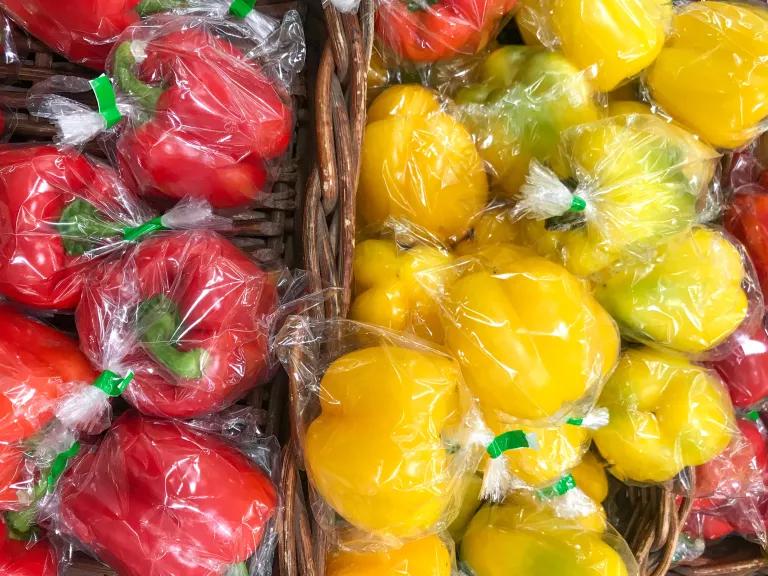
Bell peppers wrapped in unnecessary plastic at a supermarket
Getty Images
The explosion of plastic production and pollution threatens the health of environmental justice communities, ecosystems, and the general public, while jeopardizing efforts to prevent the worst of the climate crisis. A move to bioplastics won’t solve the plastics crisis. What we need are solutions and action at the local, state and federal level, including policies that:
- Reduce and eliminate where possible production and use of single-use plastic products and packaging
- Ban high-priority problematic plastic materials, additives, and product designs in favor of safer alternatives
- End government purchasing of single-use plastics
- Prioritize plastic reduction over increased plastics recycling
- Promote nontoxic refill and reuse systems
- Invest in research on chemicals and materials that are safe and sustainable by design
- Mandate full product and chemical transparency for plastics
- Prohibit plastic waste management methods like toxic plastic breakdown that aren’t recycling plastic and create harmful pollution, chemicals, and hazardous waste
- Prohibit misleading recyclability and degradability claims
State and local governments have been, and will continue to be, on the forefront of implementing these types of solutions. For example, several states and cities have focused on reducing plastic use through bans on single-use plastic bags or expanded polystyrene in various uses, as well as “skip the stuff” laws, which make single-use plastic accessories available with take out orders only upon request. In addition, several states have proposed legislation to ban toxic chemical additives in plastics and to eliminate the use of “problematic plastics” highlighted in our fact sheet (for up to date information on passed and proposed state policies, see the Safer States bill tracker).
We still need a strong federal response to the plastic pollution crisis.
NRDC and 239 other organizations are calling on the Biden Administration to take strong and immediate action, globally and domestically, to address the plastic crisis. Read more about the steps we are asking the Biden administration to take now to successfully turn the tide on toxic plastic and make meaningful strides toward protecting people and the planet.
Read more about the steps we are asking the Biden administration to take now to successfully turn the tide on toxic plastic and make meaningful strides toward protecting people and the planet.
Renée Sharp has more than 20 years of experience in environmental policy, research, and program implementation, specializing in environmental health, plastic pollution and clean energy issues. She currently serves as a Strategic Advisor for the nonprofit alliance Safer States and provides consulting services through her firm Insight Power Partners. Prior to her current roles, Renée spent 15 years at Environmental Working Group, a leading nonprofit research and advocacy organization, where she held multiple leadership positions including Research Director, California Director and Senior Scientist. Renée has also served as the Executive Director of GRID Alternatives Bay Area, where she worked to expand solar power and electric vehicle access for low-income families. She holds a master’s degree in Biology from Pennsylvania State University and bachelor's degree in Biology from Rice University.



